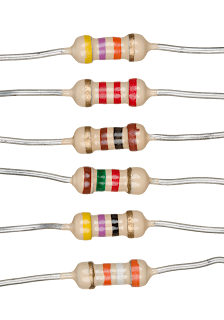resistor
A resistor is an electronic component that is used to limit or control the flow of electric current in a circuit. It is a passive component, which means that it does not generate or amplify electrical signals, but rather opposes the flow of current.
The basic function of a resistor is to provide a specific amount of resistance to the flow of current. The resistance of a resistor is measured in ohms (Ω) and is represented by a color code on the body of the resistor.
Resistors can be made from a variety of materials, including carbon, metal film, and wire-wound materials. The most common type of resistor is the carbon composition resistor, which is made by mixing carbon and ceramic materials.
Resistors are used in a wide variety of electronic circuits for various applications, such as voltage dividers, current limiting, biasing circuits, and signal conditioning. They can also be used in combination with capacitors and inductors to form filters, oscillators, and other complex circuits.
Resistors come in a range of different sizes and shapes, and their physical size and power handling capabilities are determined by their construction and materials. Some common types of resistors include through-hole resistors, surface mount resistors, and variable resistors such as potentiometers and rheostats.

Comments
Post a Comment